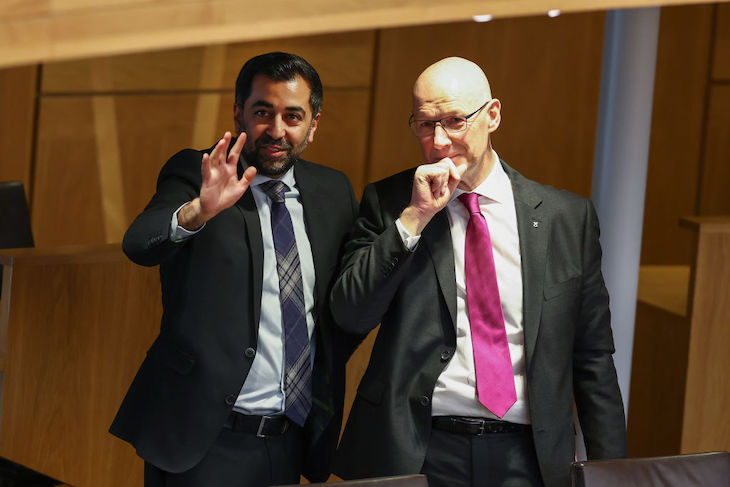While Kim Leadbeater’s assisted dying bill makes its way through the UK parliament, in Scotland a separate assisted dying bill will be voted on next week. Scottish Liberal Democrat Liam McArthur has put forward legislation that would allow those deemed terminally ill north of the border to take their own lives, with MSPs allowed a free vote on the issue on 13 May. The decision to back the bill is a matter of conscience for parliamentarians. But now, less than a week before decision day, both First Minister John Swinney and his predecessor Humza Yousaf have announced that they will vote against it.
First Minister John Swinney and his predecessor Humza Yousaf have announced that they will not back the assisted dying bill
The First Minister – whose wife has multiple sclerosis – told reporters that he ‘agonised’ over his decision, but ultimately felt he had to vote against the euthanasia bill, as he has done in the past when similar legislation was brought to Holyrood.
‘I have thought about the issue in principle: do I think it is appropriate for us to have provision in law for assisted dying? I have come to the conclusion that, in principle, I don’t think we should have that. That is my individual view,’ he added. ‘I am a man of faith and I can’t separate myself from that. It’s an incredibly personal decision. I’m conscious of the fact that I have thought about my wife, about the fact she has a terminal condition, I just couldn’t bring myself to think about this provision being any part of what lies ahead.’
Among Swinney’s concerns are fears that people may feel they are ‘a burden’ on their families and so prematurely end their lives, with any law having the potential to have a detrimental impact on the doctor-patient relationship. Swinney’s predecessor Humza Yousaf has cited similar concerns. While adamant that he ‘did not legislate on the basis of faith’, the former first minister told the BBC that, following discussions with disabled people’s organisations, he was not convinced there would be ‘strong enough safeguards’ to protect vulnerable people, insisting the bill would ‘open a door that cannot be closed’.
The statements from the two senior SNP politicians come as other groups are more reluctant to take a stance on the matter. While the Catholic Church remains – unsurprisingly – opposed to the legislation, alongside the Scottish Association of Mosques, the Holyrood Committee responsible for offering recommendations on the bill has declined to speak out. Will the First Minister’s intervention persuade others to follow suit? ‘Since John Swinney came out against the bill, we’ve had four previously undecided MSPs confirm to us they will vote for the bill at stage one,’ a Lib Dem source told me. ‘We haven’t had any new ones declare they are against.’
The Health, Social Care and Sports Committee has decided to make no overall judgement on the legislation, pointing out it is a matter of conscience for Scottish parliamentarians. Even the Church of Scotland is expected to shift from previously opposing this kind of legislation to a more neutral stance on assisted dying. Just days after the assisted dying vote is due to take place, the Kirk’s annual general assembly is expected to discuss whether it should view arguments in favour of euthanasia to be as valid as religious objections.
The divisive bill was proposed by McArthur in 2021, with the MSP pointing to similar laws in Australia and New Zealand as examples of how euthanasia can be introduced successfully. ‘The proposed law will work alongside palliative care and apply only to terminally ill, mentally competent adults,’ he insisted at the time. ‘It features strong safeguards that put transparency, protection and compassion at the core of a prospective new law.’
But after a backlash that the legislation might allow 16-year-olds to end their own lives – one of the stand-out differences between the Scottish and UK bills – McArthur has accepted he needs to change what was initially on offer, with the Lib Dem promising last week he would raise the minimum age to 18.
The wording of the Scottish legislation has ruffled feathers, too. While Leadbeater’s bill references euthanasia being made available for people with ‘untreatable’ conditions, McArthur’s instead nods to those with ‘unrecoverable’ illness – with concerns that patients who refuse medical care for otherwise treatable conditions could be eligible for assisted dying.
South of the border, Leadbeater’s controversial legislation is sparking fears about safeguarding, medical practice and patient autonomy. In Holyrood, MSPs may back the Scottish bill next week in order to further the discussion and, as in Westminster, pick apart the current detail to propose more specific amendments. But the interventions made this week by Swinney and Yousaf point to the significant concerns that remain about opening this particular door.








Comments